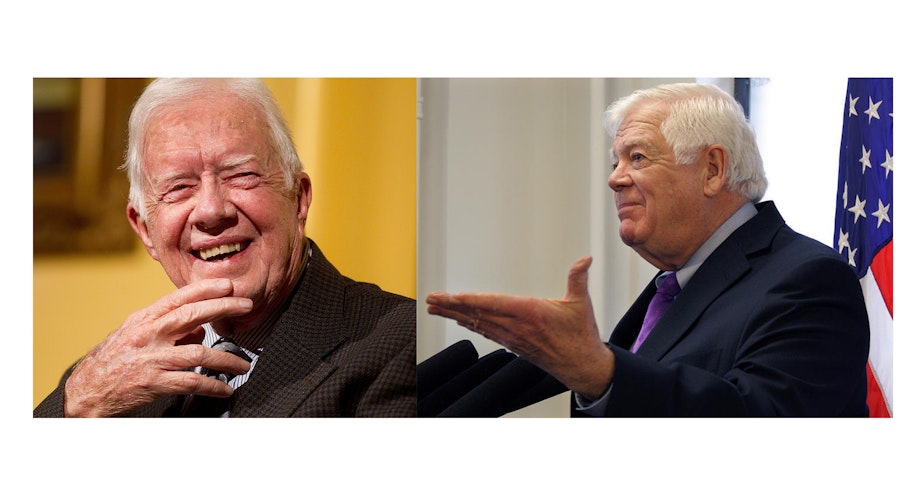WA's Jim McDermott remembers Jimmy Carter on the campaign trail and beyond

Former President Jimmy Carter lay in state today at the U.S. Capitol.
He will be laid to rest on Thursday.
Former Washington Democratic Congressman Jim McDermott is among the many people reflecting on Carter's life and times.
On election eve in 1980, he was with Carter for his final campaign stop, a rally at Boeing Field. McDermott was running to be Washington's next governor. Carter was trying to win a second term. Both would fall short.
RELATED: A look back at Jimmy Carter's presidency
KUOW’s Kim Malcolm spoke to McDermott about that time and Carter's legacy.
This interview has been edited for clarity.
Sponsored
Kim Malcolm: Can you take us back to that rally in 1980? How hopeful were you that you would both win?
Jim McDermott: Well, I still thought I had a chance at that point. I was pleased that the president was coming to be on the stage with me and give me a feeling of his aura. This was really my introduction to the president. He was very warm and very helpful, and he shared some stuff about his own political campaigns and how they'd worked — or how they hadn't worked. So, it was a very friendly thing to develop quickly with a man like him.
Carter became known for sharing messages some people didn't especially appreciate hearing. Famously, during the energy crisis in the late '70s, he told Americans they should turn down their thermostats and put on sweaters. Are there any lessons to be drawn from his career about how to address voters in a way that is honest but still effective?
That is the tightrope that all of us walk, trying to do what you believe and still keep enough people believing that you're a good person. In public office, if you're going to do something and you're really going to take risks and you're going to try and change things and make them better, you run the risk always of being rejected in the next election.
RELATED: Jimmy Carter's policy on the environment laid out the U.S. response to climate change
Sponsored
I always thought about myself in the Congress that 700,000 people had to decide: do they want me for two more years or not? And I'm going to do the best I can. I might not be what they like, but I was going to try and do that. And Carter did that as a president. He did it, absolutely, what he believed. They made jokes out of him with all of his attempts to let people know, "This is what's going on, folks. This is the truth."
And of course, the president always gets blamed for the fact that the price of oil has gone up, and he gets blamed for the interest rates going up. But when he tries to explain to them what's happening or what they need to do, how they need to play a part in it, it's hard. It's a hard sell. People have to decide whether they want to have the truth or they want to have somebody make them feel good. That's a hard line to walk as a politician, because it's much easier to tell people what they want to hear.
Carter was famously a one-term president, but he had a renaissance in his next chapter, in his post-White House life. I'm wondering if you ran into him in later years?
I did. I actually was on a Habitat for Humanity project with him. I went down and met him there. And I mean, he was the real deal. His life after the presidency really cements what his goals and what his core beliefs were. He didn't stay in Washington and make a million dollars, or he didn't stay in Washington and use the presidency to somehow aggrandize himself.
RELATED: How Jimmy Carter made a lasting impact on mental health policy in the U.S.
Sponsored
And as a person, how are you going to remember him?
I'm going to miss him, in part because I see what's happening in the political situation now. I'm so unhappy with it and so distressed by it that I will always think back to Jimmy Carter, the guy who was willing to stand up and say stuff and do stuff. Everybody wants a politician to be honest. Then when you are, you pay the price, because it turns out, well, they didn't really want to know the truth. They didn't really want to know what you thought. But Jimmy Carter, he'll always be a beacon for me. He was a good man.
Listen to the interview by clicking the play button above.





